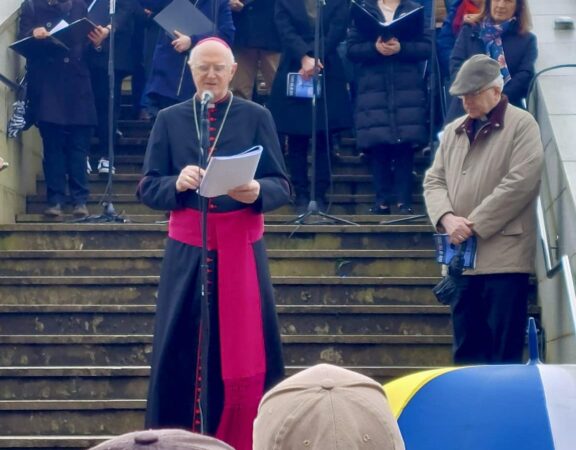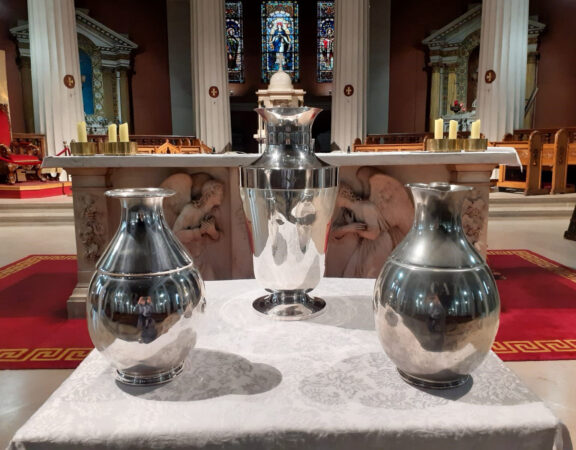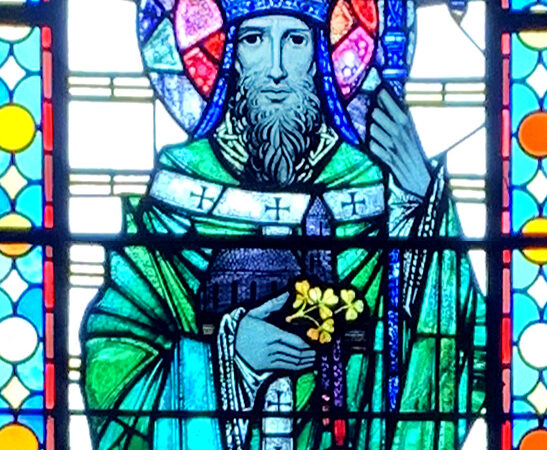Please find below two Christmas Homilies from Archbishop Diarmuid Martin. The first is for Christmas Midnight Mass which Archbishop Martin will celebrate in Dublin’s Pro Cathedral in Dublin at 10pm this evening (24th). Tomorrow morning(25th) Archbishop Martin will celebrate Christmas Day Mass at 9.30am with the prisoners and staff of Mountjoy prison.
CHRISTMAS MIDNIGHT MASS 2007
Homily notes and Message of
Most Rev. Diarmuid Martin
Archbishop of Dublin, Primate of Ireland
—————-
Pro-Cathedral, Dublin 24th December 2007
Most Rev. Diarmuid Martin
Archbishop of Dublin, Primate of Ireland
—————-
Pro-Cathedral, Dublin 24th December 2007
Few occasions fill our hearts with such joy as Christmas night. Each year Christmas is different yet each year Christmas manages to conquer our hearts. Many lament the commercialisation of Christmas. And there are many good reasons for such lamenting. But in the end, the real Christmas message always breaks through. Christmas always wins out. We can feel that in a tangible way here this evening as we gather to celebrate the mystery of the birth of Jesus.
Christmas has been celebrated throughout history in good times and bad, in persecution and in triumph, in peacetime and in war, in times of abundance and in times of shortage: yet in all of those situations people have found a way to celebrate Christmas as it should be celebrated and despite what many would have expected, the message of Christmas has appeared as a message of light, of joy, of simplicity in the best sense of that word, of hope and of genuine love.
The Christmas message in its essence touches all, even those who might not profess themselves as believers. Indeed many who do not consider themselves believers might be surprised to realise that what they experience in their own way at Christmas, is directly linked to the Christmas message. The message of the birth of Jesus was announced as a message which touches all persons of goodwill. The message of the birth of Jesus reaches out to all who allow God’s favour to touch them, either in a conscious or an unconscious way. The message of the coming of God into human history is about all.
In another sense, many of us who do believe and who celebrate the birth of Jesus may not fully grasp the significance of the event. All of us can get caught up in the marginal aspects of the feast and find our reflection drifting off in false directions. Celebrating our Christmas Mass here this evening is an invitation to renew for ourselves the true spirit of Christmas. The message of Christmas is about the love of God. Christmas reveals to us something of who God is and what his love is like.
Let us look more closely then at some aspects of the Gospel narrative of Saint Luke we have just heard.
Many of us have been lead to think that Jesus was born in a cattle shed simply by an accident of events. There were so many people in Bethlehem that night, we think, that there was literally no room in conventional accommodation and Joseph and Mary had to arrange things as best they could. Yes, this is true but it is not the complete truth. Do we ever ask the question: where do we think that Jesus should have been born? If we were to decide where God would enter into human history, what sort of appropriate birthplace would we have chosen?
Certainly we would wish for a more noble place than a cattle shed. We would perhaps not think it appropriate that he should have been born in ostentatious luxury, but the idea of God being born in the squalor of a cattle shed is the other extreme.
Yet that was God’s way. God chose to reveal himself in poverty. The God of power and might entered human history in the form of the most vivid image of human helplessness, as a tiny infant. In choosing so, he showed us who God is; he showed us what God is like; and thus he showed us how we should live.
The God revealed in Jesus Christ is a God who is totally unassociated with any of the external supports of the world. God is totally other and God is utterly free. He appears outside and above all human convention; he owes nothing to any exterior form of power and authority, much less to any fashion or trend. Following the path of freedom from entrapment by power and possession – the path which is revealed in the birth of Jesus Christ – is the only path which will make us free people also.
The first challenge about the commercialisation of Christmas we have to address must be a challenge to ourselves. Why are we not free? What are we covering up, what are we fleeing from, why do we need these external supports in order to be able to celebrate? What are the factors which rob us of our true freedom and drive us into the false world of consumerist satisfaction? Only opening ourselves to Jesus’ message of unselfish love will we open the deepest freedom which we possess and will we be truly ourselves.
Being critical of the commercialisation of Christmas is not being kill-joy, but it is recalling us to a sobriety in our use of the goods of the earth which is in keeping with what the message of Christmas teaches us. In that way we can enjoy Christmas with a joy that lasts and a hope which endures, even when life is hard or harsh.
How do people react to Gods’ self revelation? In Saint Luke’s narrative around the birth of Jesus there is mention on three occasions of a sign. At the birth of John the Baptist, his father Zachariah asks for a sign. When asked to be the mother of the coming saviour, Mary is given a sign: she is told that he cousin Elizabeth was to give birth. What is the meaning of that sign?
Mary has no social standing. She was a simple girl, not of noble origin, unknown outside her immediate family. The news that Elizabeth was expecting a child in her old age is a sign of the greatness of God’s love. It is the sign that proves to Mary that what has been promised is true and will happen. Nothing is impossible to God and his favour comes without any merit of our own. The sign of God’s goodness to Elizabeth is a sign to Mary, not that she is to enter into the realm of the powerful, but that she has been chosen especially for her lowliness and her total willingness to allow God to work through her.
The third sign is the sign given to the shepherds. It is again an unlikely sign, the most unlikely sign that they could have imagined. To whom does God make the first announcement of his presence in human history? Angels, messengers of God’s transcendent power, appear to poor shepherds engaged in their hard and lonely work in the cold of midwinter. They are told that the greatest event in all history, the birth of the long awaited Saviour, has occurred and that they are the first to receive the announcement. They are told that the sign that will tell them that this has happened will be an encounter with a helpless newborn infant, wrapped in the typical birth clothes of the poor, lying in a manger. Is this to be believed? Surely God would turn to the powerful, the influential to make known such a unique event for all humankind?
The shepherds do not have these doubts. They go and they find Jesus, just as had been promised by the angels, and they worship him. They accept the sign for what it was. There was no discussion, no interpreting, and no thinking that this should have been done in another way, no imposition of their values. God’s good news always comes in surprising ways if we have the internal freedom and humility to accept it.
Through the Shepherds, the sign became promise for all. They did not question but recognised. With that recognition the Glory of God was released, revealed and acknowledged in the world. The choirs of angels break into song. At that moment the world has become different.
Jesus appears as a child. Christmas is the feast of childhood. True childhood is a sign of the presence of God. One of the challenges for the future will be the way we safeguard and treat childhood here in Ireland and worldwide. Thousands of hildren die daily of hunger and curable diseases. Children are drafted into the horrors of war at a young age.
Sadly representatives of the Church have damaged and abused children and we still have a path to go to ensure that all Church structures recognise the extent of such hurt and work in a unified way to safeguard children. Sadly however children are abused in many other areas of society. The Ireland of plenty has not provided the same opportunity for all its children. The children of tomorrow will grow up in a very different Ireland. We have the opportunity to create a better future for all our children. We need a renewed vision and a pledge to work together to ensure that our educational system provides the best for all our children, whatever their social or ethnic background. We have the opportunity to ensure that Ireland gets the best possible model of care for its sick children.
In training our children to be consumerist at younger and younger age we are robbing our children of something precious and we are leading them away from the very possibility to be able to recognise the true message of Jesus birth. We owe it to our children in a special way to open their hearts to God, to help them experience the wonder of life and to rise above egoism and individualism. Pope Benedict has reminded us in his latest Encyclical that: “Science can contribute greatly to making the world and mankind more human. Yet it can also destroy mankind and the world unless it is steered by forces that lie outside it” (#25). And he adds:”It is not science that redeems us: we are redeemed by love” (#26).
Christmas is the feast of childhood. It is the feast of childhood not just because we overwhelm children with gifts. The true sense of Christmas can at times be best re-cognised by what our children teach us. In their values we can discover something of what God was telling us on that first Christmas when he appeared as a child.
Christmas is the night when we learn from children and when we ourselves become children, when we recognise that we will only grow to human maturity and freedom by allowing the power and the love of God to work through us and to change us. When we open ourselves in that way, we too can cry out: Glory to God; Peace on our earth and to all on whom God’s favour has come.ENDS
——————————————————————————————————————————————–
CHRISTMAS MORNING 2007
Homily notes of
Most Rev. Diarmuid Martin
Archbishop of Dublin, Primate of Ireland
—————-
Mountjoy Prison, 25th December 2007
Most Rev. Diarmuid Martin
Archbishop of Dublin, Primate of Ireland
—————-
Mountjoy Prison, 25th December 2007
Few occasions fill our hearts with such joy as Christmas. Each year Christmas is different yet each year Christmas manages to conquer our hearts.
Christmas has been celebrated throughout history in good times and bad, in persecution and in triumph, in peacetime and in war, in times of abundance and shortage: yet in all of those situations people have found a way to celebrate Christmas as it should be celebrated and despite what many would have expected, the message of Christmas has appeared as a message of light, of joy, of simplicity in the best sense of that word, of hope and of genuine love. In the end, the real Christmas message always breaks through. Christmas always wins out. We can feel that in a particularly strong way here this morning.
This is certainly not the place that you would have wished to be on this Christmas morning, but I hope that you will experience some of the joys of the day and that those same joys will be present with your families, your loved ones and especially your children, wherever they are.
The message of the birth of Jesus reaches out to all who allow God’s favour to touch them, whether they are aware of it or not. Celebrating our Christmas Mass is an invitation to renew for ourselves the true spirit of Christmas. The message of Christmas is about the love of God. Christmas tells us something of who God is and what his love is like.
Let us look more closely then at some aspects of the Gospel story of Saint Luke we have just heard.
Many of us have been lead to think that Jesus was born in a cattle shed simply by an accident of events. There were so many people in Bethlehem that night, we think, that there was literally no room in conventional accommodation and Joseph and Mary had to arrange things as best they could. Yes, this is true but not the complete truth. Do we ever ask the question: where do we think that Jesus should have been born? If we were to decide where God would enter into human history, what sort of appropriate birthplace would we have chosen?
Certainly we would wish for a more noble place than a cattle shed. We would perhaps not think it appropriate that he should have been born in ostentatious luxury, but the idea of God being born in the squalor of a cattle shed is the other extreme.
Yet that was God’s way. God chose to reveal himself in poverty. The God of power and might entered human history in the form of the most vivid image of human helplessness, as a tiny infant. In choosing so, he showed us who God is; he showed us what God is like; and thus he showed us how we should live.
The God revealed in Jesus Christ is a God who is totally unassociated with any of the external supports of the world. God is totally other and God is utterly free. He appears outside and above all human convention; he owes nothing to any exterior form of power and authority, much less to fashion or trend. Following the path of freedom from entrapment in power and possession – which is revealed in the birth of Jesus Christ – is the only path which will make us free people also.
This applies to you here today where your freedom is curtailed. It will apply even more when you leave this place of detention and you are returned to “freedom”. It is not just prison bars which can rob us of our freedom. It is only in opening ourselves to Jesus’ message of unselfish love that we will open the deepest freedom which we possess and will we be truly ourselves.
To whom does God make the announcement of his presence in human history? Angels, messengers of God’s transcendent power, appear to poor shepherds engaged in their hard work in midwinter. They are told that the greatest event in all history, the birth of the long awaited Saviour, has occurred and that they are the first to receive the announcement. They are told that the sign that will tell them that this has happened will be an encounter with a helpless newborn infant, wrapped in the typical birth clothes of the poor, lying in a manger. Is this to be believed? Surely God would turn to the powerful, the influential to make known such a unique event for all humankind?
The shepherds do not have these doubts. They go and they find Jesus as had been promised by the angels and they worship him. They accept the sign for what it was. There was no discussion, no interpreting, and no thinking that this should have been done in another way, no imposition of their values. God’s good news always comes in surprising ways. God speaks through unlikely voices and in unlikely places. Take the time to think of what God is saying to you and through you today, in your own particular situation.
Through the Shepherds, the sign became promise for all. They did not question but recognised. With that recognition the Glory of God was released, revealed and acknowledged in the world. The choirs of angel burst into song. At that moment the world had become different.
Christmas is the moment when the power and the love of God come into our hearts to change us. May each of you experience something of that love of God on this Christmas! May that love embrace you and bring out from your hearts the very best that is within you. May it bring out what is good in you and may you work to see that goodness becomes the dominant aspect of your lives.
Glory to God. Peace on our earth and to all on whom God’s favour has come.ENDS









